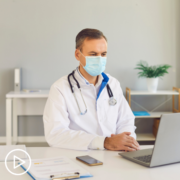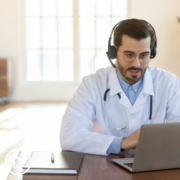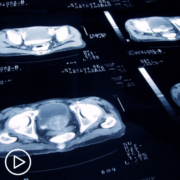What Is Precision Medicine for Prostate Cancer?
What Is Precision Medicine for Prostate Cancer? from Patient Empowerment Network on Vimeo.
Prostate cancer has the option of precision medicine in the treatment toolbox. Dr. Heather Cheng from Seattle Cancer Care Alliance defines precision medicine and explains how it is used to help provide optimal prostate cancer care.
See More from Prostate Cancer TelemEDucation
Related Programs:

Should Prostate Cancer Patients and Families Keep Using Telemedicine? |

How Can We Improve Remote Access for Prostate Cancer Patients? |

|
Transcript:
Sherea Cary:
So, what is precision medicine? And what…and what is precision medicine when we think about prostate cancer?
Dr. Heather Cheng:
Yes, it’s a great question and something I get really excited about. So, precision medicine, I guess in a nutshell would be finding out more about somebody’s personal prostate cancer and being more precise about our treatment decisions, meaning using that information to avoid overtreating or using drugs or treatment that don’t work and choosing treatments that we have a much higher level of confidence will be effective. Now, that’s the potential, sometimes we’re more successful than other time, but in prostate cancer, we have a few exciting examples that are, I think that are new, that I think just get me really excited because, for example, some cancer…some people, cancers have certain mutations or markers in them, that if they’re there, which is not in all people with prostate cancer, but if they’re there, then we have a different treatment tool box for those patients, so we have new extra, extra drugs or extra treatment opportunities, and that’s the sort of precision aspect or tailoring or we’re making the treatment it better for the patient and their cancer, and that’s really exciting, so it’s not one-size-fits-all, but kind of more tailored to the patient and their particular cancer.
New Developments in Prostate Cancer Care
New Developments in Prostate Cancer Care from Patient Empowerment Network on Vimeo.
Prostate cancer care has seen some recent developments. Dr. Heather Cheng from Seattle Cancer Care Alliance shares updates that are likely to be shared at the American Society of Clinical Oncology (ASCO) conference and a recent treatment approval.
See More from Prostate Cancer TelemEDucation
Related Programs:

Should Prostate Cancer Patients and Families Keep Using Telemedicine? |

|

|
Transcript:
Sherea Cary:
Are there any exciting developments being presented at the upcoming ASCO conference that you can share with us?
Dr. Heather Cheng:
Yeah, I think one of the most recent, really exciting…there are many, it’s hard to pick just one. As a medical oncologist, I’m probably paying more attention to the Phase III clinical trials in the more advanced disease, meaning for patients who have metastatic cancer, cancer of the process started in the prostate that spread to other parts of the body. There are trials that show that the combination of effective drugs that we currently use in the latest stages of prostate cancer, metastatic prostate cancer, we are moving them earlier in the disease spectrum, meaning we are not waiting until the end when people are really sick. We’re trying to use them earlier, and we’re trying to use them in combination with each other to improve the outcomes of men with advanced prostate cancer, so men with prostate cancer that has spread outside the prostate can actually now live longer than they ever have ever before, which is really, really exciting. We do need to be thinking about side effects, but some of the newest strategies are, for example, trying to understand how we can use immunotherapy more effectively, so many people may be aware that immunotherapies are manipulating the immune system, is really effective in some types of cancers, and they have different side effects than chemotherapy, most of the time, they have fewer side effects that they occasionally can have pretty serious side effects, but as a general strategy, it’s very exciting in oncology to say, Can we encourage your own immune system, your defense system, your built-in defense system, to be more effective in addressing cancer without as many of the side effects. If we could do that, we would really be in a much better place, and for prostate cancer, it hasn’t historically been as effective, but many of the strategies now are trying to understand how can we manipulate the system and maybe give different combinations so that that works just as well as it does for some of the other cancers.
So, that’s number one, number two is thinking about this idea of precision oncology or tailoring the treatment to the person’s cancer are based on the genetics of their cancer and genetics of the patient, and we already have some examples now of how that’s really exciting and effective, and I think then the third strategy the third approach that I’m really excited about is these drugs that are what we call targeted radiation therapies, or there’s the drug called lutetium [Editor’s note: Pluvicto is now approved] that is likely to be approved soon, where there is a radiation molecule that is linked or tagged to basically a homing device. So, it’s an antibody, which is something that is made by the body’s immune system, but basically hones in on any cell in the body that expresses this tag called prostate-specific membrane antigen, so you’re taking a smart delivery of radiation just to those cells, not to the other cells. So, it’s hopefully not going to have as many side effects, but it’s going to be really effective, so those are the kind of maybe in a high level over some of the things I am really excited about, and always there’s more progress and more to talk about, so hopefully, I can tell you about it again.
Sherea Cary:
Thank you. I find the information that you are providing about smart medicine very informing, and I think it can be used to help promote education in the community when we want to talk about prevention because when we talk about cancer, this…there’s this overwhelming feeling about it, and there’s sometimes a feeling of no hope, but when we put out more information about there’s ways that treatment can be targeted and where we can do prevention, if we find out early, treatments can be different and you can continue on with your life, I think that that makes a huge difference. And the more information that is provided about smart technologies for medical treatment is going to make a difference in the area of educating patients and caregivers about prevention and the importance of prevention.
Dr. Heather Cheng:
Absolutely, I think actually the most exciting thing about what I do is not necessarily the targeted precision treatments that I mentioned, what I get most excited and passionate about it is the fact that if those mutations are genetic, then what can we do for the brothers, for the sons, for the nephews, that can change things so that they don’t have to have those late-stage medications that we find the cancer early, we cure the cancer, so that it’s a non-issue. And I think that’s possible. We have to start somewhere, but I think we can definitely see benefit at the advanced disease setting, but I’m most excited and hopeful for the earlier… The sort of people who might be at risk where we can do something. Just as you said, screening prevention…knowledge can be power. Knowledge doesn’t need to be a burden.
Are Mobile-Optimized Tools Making an Impact in Prostate Cancer?
Are Mobile-Optimized Tools Making an Impact in Prostate Cancer? from Patient Empowerment Network on Vimeo.
Prostate cancer screening can now be accessed via some mobile methods. Dr. Heather Cheng from Seattle Cancer Care Alliance shares information about mobile-optimized tools and access – and how mobile access is working toward health equity.
See More from Prostate Cancer TelemEDucation
Related Programs:

Should Prostate Cancer Patients and Families Keep Using Telemedicine? |

|

Can Prostate Cancer Patients Rely on Telemedicine Without Risk? |
Transcript:
Sherea Cary:
Can you speak to any mobile-optimized tools making a difference in prostate cancer?
Dr. Heather Cheng:
So, I don’t know specifically about…well, I can speak about some efforts I know about, but I think the mobile options are really a great idea. And I think the way I would think about it is, there are maybe…and I know this is the case, for example, mammograms. But I know that there can be traveling clinics where they may offer, for example, the prostate-specific antigen blood tests, which can be used as a screening to determine if somebody might have prostate cancer, and that might be something that somebody otherwise is really busy and doesn’t necessarily have access to. Usually, it’s something that is done by the primary care provider but can be done through mobile access, and I think some of the procedures could be done like blood tests for prostate cancer, I think to get an actual diagnosis to really be confident that there is prostate cancer, not something that’s just causing the PSA, that blood test could be high. Sometimes people can have a high PSA without cancer, and so it’s important to actually get a biopsy to help be more confident and know for sure that there’s cancer. That’s usually done in a clinic, but the screening, meaning the sort of trying to figure out if somebody’s at higher risk or not can be done in a mobile van, and I think there are a number of many excellent programs around the country, not enough, probably, but whose mission it is to try to improve access to cancer screening.
Why Is Specialized Care Important in Prostate Cancer?
Why Is Specialized Care Important in Prostate Cancer? from Patient Empowerment Network on Vimeo.
Prostate cancer specialized care can be utilized in different ways. Dr. Heather Cheng from Seattle Cancer Care Alliance explains the various ways specialized care can be used to help provide the best care in prostate cancer diagnosis and treatment.
See More from Prostate Cancer TelemEDucation
Related Programs:

Prostate Cancer Genetic Testing and Family Testing Guidelines |

|

|
Transcript:
Sherea Cary:
Can you speak to the importance of connecting to specialized care in prostate cancer?
Dr. Heather Cheng:
Yes, I think it is really important when people are thinking about a diagnosis of prostate cancer, which is a difficult thing under the best of circumstances, but it’s so important to get the best information, the most current information. And if you’re thinking about prostate cancer surgery, if you’re thinking about prostate cancer radiation, if you’re thinking about medical therapies, you want to make sure that you have the most up-to-date knowledge and you’re in the best hands, and sometimes that’s going to a cancer center or a center that does see a lot of patients like you, who have cared for a lot of patients who have been in a situation like yours and have a lot more experience and have knowledge about the most current treatments and have experience. And so I think it’s important when you’re getting a diagnosis to get that information, and to at least have knowledge about all of your options and get the best knowledge, and I think that’s where patient education and then also getting second opinions can be really helpful, and telemedicine is allowing that to be easier, but really getting all the information before you make a decision and feeling that you’re well-informed is really going to go a long way in improving your outcomes and getting kind of the best treatment that you deserve, right? Patients really deserve that.
What Is the PROMISE Study for Prostate Cancer Patients?
What Is the PROMISE Study for Prostate Cancer Patients? from Patient Empowerment Network on Vimeo.
Prostate cancer patients may have access to participate in prostate cancer studies. Dr. Heather Cheng from Seattle Cancer Care Alliance shares information about the PROMISE Study that she’s involved with and what the study examined in prostate cancer genetics.
See More from Prostate Cancer TelemEDucation
Related Programs:

How Is Genetic Information Used for Prostate Cancer Treatment? |

|

|
Transcript:
Dr. Heather Cheng:
The PROMISE Study is a study that I’m conducting in partnership with my colleague, Dr. Paller at the Johns Hopkins and other collaborators throughout the United States, and it’s a study to help men with prostate cancer understand their genetics. We know that there are many people who have prostate cancer who have genetic risks of prostate cancer, maybe they inherited a risk factor, but they don’t know about it, and this is important to know because now we have targeted or precision treatment options on additional toolboxes, treatments exciting treatments for those patients, but they may not be aware of it if they don’t know about their genetics. And so one is, it’s increasing the knowledge, and then also it may have important implications for the relative, so sometimes those genetic factors are shared and that information can also be life-saving. So the study is really easy, actually, patients who are interested or people that are interested who had a diagnosis of prostate cancer, go to the website, which is www.prostate cancer promise.org, and then they can read about the study and they can enroll on the web or by the Internet, and then they are mailed a saliva test or kit, and then they spit into the kit and then mail it back, and then they get a medical-grade genetic testing report back that test 30 genes that are associated with cancer risk.
So some of those are prostate cancer, but then men who have certain mutations that we’re particularly interested in will be invited for long-term more…more long-term follow-up in all patients who participate can get a newsletter where we sort of inform them about the newest, latest, greatest things and prostate cancer. And so I think it’s really exciting because it’s increasing the ability and access of patients to genetic testing, but then also leveraging our web-based information platforms, just like this one, is to advance education and make sure we’re getting all of that excitement and opportunities out to patients even if they live far away from some of the biggest cancer centers, we want to make sure all patients have access to that knowledge.
Can Prostate Cancer Patients Rely on Telemedicine Without Risk?
Can Prostate Cancer Patients Rely on Telemedicine Without Risk? from Patient Empowerment Network on Vimeo.
Prostate cancer patients may have concerns about risks posed with telemedicine care. Dr. Heather Cheng from Seattle Cancer Care Alliance discusses telemedicine risks and benefits and specific situations when in-person visits help provide optimal patient care.
See More from Prostate Cancer TelemEDucation
Related Programs:

|

|

Are Mobile-Optimized Tools Making an Impact in Prostate Cancer? |
Transcript:
Sherea Cary:
Is relying on telemedicine when managing prostate cancer without risk?
Dr. Heather Cheng:
No, I think with anything, there’s always some risk, I think the risks that I see as much as there are possibilities and benefits is that it can be difficult sometimes to get all the information about a patient from two dimensions. There’s a lot to be said for seeing somebody in a room in 3D, and really getting a sense of their overall help, being able to examine them, so sometimes there are things we can’t replace in terms of listening to somebody’s heart and lungs then maybe doing other examination and procedures to really understand where the patient is things like biopsies, things like treatment, seems like blood draw may still need to be part of the patient’s care in order to give the best recommendations, so even though I think there’s a huge amount of possibility for benefit of telemedicine, there are some things that cannot be replaced, and that’s the danger that if patients don’t come, if I never see somebody in 3D in clinic, then I’m losing some valuable information about that patient, and so there are times when we still like to see people maybe it’s not as frequently, so it’s more convenient, but there are times when we definitely still need to meet with people face-to-face, do procedures or medications or just lay eyes on them in real life.
So, I think that’s a danger. If that’s not present at all, then we’re going to miss important things in people’s healthcare.
Telemonitoring and How It Benefits Prostate Cancer Patients
Telemonitoring and How It Benefits Prostate Cancer Patients from Patient Empowerment Network on Vimeo.
Prostate cancer can benefit from the use of telemonitoring as part of care. Dr. Heather Cheng from Seattle Cancer Care Alliance explains telemonitoring and situations when telemonitoring can be beneficial for prostate cancer care.
See More from Prostate Cancer TelemEDucation
Related Programs:

Prostate Cancer Genetic Testing and Family Testing Guidelines |

Can Prostate Cancer Patients Rely on Telemedicine Without Risk? |

Are Mobile-Optimized Tools Making an Impact in Prostate Cancer? |
Transcript:
Sherea Cary:
What is telemonitoring? And does it benefit prostate cancer patients?
Dr. Heather Cheng:
Yeah, telemonitoring. I think probably for prostate cancer it would best be described as monitoring symptoms, side effects, and may also include following the PSA blood and other blood tests that can be drawn at the convenience of the patient, so they may be for example, a patient could go to the lab, have their blood drawn on the weekend when they’re not working, and then have those results be available for their visit, or sometimes they don’t even need to have a visit and they can do a lot of the communications by the patient web portal, so we increasingly have that as an option where the nurses are able to…the whole team can work together to us help the patient in between, so maybe it’s not in real time, but it’s a little bit like email or Twitter where there can be communication about a patient’s healthcare and maybe a side effect optimization like somebody’s having side effects and we adjust the medication or we add another medication to make it more easy to manage, so that’s definitely something that I think is more possible in the current era of telemedicine and telemonitoring.
How Can We Improve Remote Access for Prostate Cancer Patients?
How Can We Improve Remote Access for Prostate Cancer Patients? from Patient Empowerment Network on Vimeo.
How can prostate cancer remote access and care be improved for patients? Dr. Heather Cheng from Seattle Cancer Care Alliance shares how optimal remote care can be ensured and explains some situations when in-person care can provide better care.
See More from Prostate Cancer TelemEDucation
Related Programs:

Should Prostate Cancer Patients and Families Keep Using Telemedicine? |

|

|
Transcript:
Sherea Cary:
It sounds like to me that telemedicine is similar to the work from home, and it seems like we’re all getting benefits from the ability to be able to do some things in a remote fashion. Are there any steps being taken to improve remote access for prostate cancer patients?
Dr. Heather Cheng:
Yeah, I think…I don’t know that the efforts that we have are specific to prostate cancer patients, but I sure hope that prostate cancer patients, like all of our patients across medicine can continue to benefit from these new technologies, and I think we are getting better…we’re not perfect, of course, there’s always room for improvement, but we’re getting better at trying to partner with our patients to figure out how to do this in a way that is as optimal as possible, and sometimes I think there is great value still to seeing people face to face and examining them, and sometimes that can’t really be replaced, but maybe that’s not all the time for all the visits, and so as long as patients are comfortable using the platform, using the telemedicine, using the software and the phone, those things, some patients aren’t. So, I think we need to really make sure that the patients who are not comfortable or who need a little extra help with the technology get the help they need so that they are not left behind. Because I do worry a little bit about people who may be not as comfortable with using video conference or ZOOM or things that many of us are getting more familiar with, but not all patients are, so we need to just make sure we’re thinking about those of those who may not be quite as comfortable or maybe whose Internet access is not as stable, things like that.
Prostate Cancer Treatment Tools and Advancements
Prostate Cancer Treatment Tools and Advancements from Patient Empowerment Network on Vimeo.
What’s the latest in prostate cancer treatment tools and advancements? Dr. Heather Cheng from Seattle Cancer Care Alliance shares information about areas of prostate cancer research that have experienced recent advancements.
See More from Prostate Cancer TelemEDucation
Related Programs:

Should Prostate Cancer Patients and Families Keep Using Telemedicine? |

How Can We Improve Remote Access for Prostate Cancer Patients? |

|
Transcript:
Dr. Heather Cheng:
I think it’s a really exciting time. I think there are a lot of advancements throughout prostate cancer. I think one area of importance is early detection, but we also have newer imaging platforms, meaning the way, and we can discover where the prostate cancer is, is advancing through new types of PET scans that we didn’t previously have. And then my own kind of research which is near and dear to my heart is talking about genetics and what we have learned about the genetics of the risk of prostate cancer, but also how the genetics of the cancer itself, which sometimes is inherited, and sometimes isn’t can help us plan for better treatments for patients.
Understanding New Targeted Therapies for Prostate Cancer
Understanding New Targeted Therapies for Prostate Cancer from Patient Empowerment Network on Vimeo.
Which prostate cancer therapies are experts excited about? Dr. Heather Cheng from Seattle Cancer Care Alliance shares information about recent treatment advancements and how the therapies are utilized to help provide optimal prostate cancer care.
See More from Prostate Cancer TelemEDucation
Related Programs:

|

|

|
Transcript:
Sherea Cary:
So, Dr. Cheng, share with us some of the new treatments that you and your colleagues are excited about?
Dr. Heather Cheng:
Thank you. So I am a medical oncologist, I specialize in genetics, most of my patients have more advanced prostate cancer, meaning they have had surgery to remove their prostate, but then their cancer continued to grow or that they have radiation and their cancer continued to grow, and we are…then looking at treatments that are medical, and by that I mean they are given through a pill, or they’re given and through an injection and they travel throughout the body and treat the cancer…wherever the cancer is.
And I think what I get very excited about is that we have new targeted therapies, and by that I mean some of my patients to have certain mutations in their cancers or DNA changes in their cancer, have access to newer treatments like a pill, for example, called in a family called PARP inhibitor, that are really especially effective against cancers that have that type of mutation. So can’t we learn about this whether it’s a good fit or whether that person’s cancer might especially be well treated by that drug by doing DNA sequencing of the cancer or DNA sequencing of that person’s DNA, inherited DNA. So, both of those can give us clues about this kind of special treatment toolboxes that I get very excited about, and so I think that’s the frontier in oncology, but also in prostate cancer as well.
Prostate Cancer Genetic Testing and Family Testing Guidelines
Prostate Cancer Genetic Testing and Family Testing Guidelines from Patient Empowerment Network on Vimeo.
What do patients need to know about prostate cancer genetic testing? Dr. Heather Cheng from Seattle Cancer Care Alliance shares information about genetic testing, testing guidelines for those with a family history of prostate cancer, genetic counseling, and when it’s important to share family medical history.
See More from Prostate Cancer TelemEDucation
Related Programs:

How Is Genetic Information Used for Prostate Cancer Treatment? |

|

Are Mobile-Optimized Tools Making an Impact in Prostate Cancer? |
Transcript:
Sherea Cary:
Is it easy to get the genetic testing, and if you have a first-degree relative, if you had a father who had prostate cancer and your son, is it easy for them to get the testing, and do you recommend it?
Dr. Heather Cheng:
Yeah, I think that’s a question that I think it’s becoming easier, it is something that I think it’s important for people to understand what it can and cannot do, so if there is a strong family history of prostate cancer, for example, it is best to start with the person in the family who has cancer, if we were talking about genetic testing, if that’s possible. If it’s possible, testing that person, because if they have that marker, then we’re more confident that that’s important for the family, it’s sort of…if that person doesn’t have it, then it’s much less likely that the children or the relatives who don’t have cancer will have it. So I guess thinking about the person who has cancer and then also sharing with the family, sharing what the doctor is a family history of cancer.
But I guess one of the things that’s really interesting and I would guess, I would say challenging but exciting in the field, is that historically, we’ve had a reliance, or we’ve needed to do genetic testing through genetic counselors. And genetic counselors are professionally trained individuals who can answer questions about genetics, and sometimes patients or persons, people have a lot of questions, maybe they are not sure they want to do it, and so if they’re not sure that it’s important to get them the information so they can understand what the testing is about and then feel good about proceeding with testing. I think there’s a lot of value to knowing about somebody’s genetics, but there can be questions and concerns, and so we want to make sure every person has the chance to do that.
We have studies, and more and more, I think there is availability of genetic testing and people can do genetic testing through blood test or a saliva test, and the other thing that’s really important to understand is that there’s kind of two major classes of genetic testing, I would say, one is what I would call recreational for fun, and those are tests like 23andMe or Ancestry.com, where you’re trying to maybe you pay some amount of money and you want to know where in the world your relatives are from. That’s more for fun, it’s not really useful for medical purposes, if you’re thinking about genetic testing for how to manage your medical care, you might want to talk to your doctor about it, but there’s a different set of tests that are really medical-grade, and they shouldn’t be confused with each other because they have really different purposes. One is more recreational and one is, we need the quality to be much higher because we’re gonna use this information for your care, and we want to make sure is the sort of standards are a lot higher, and so for example, I have a study with my colleague, Dr. Paller at Johns Hopkins, where we were offering then we’ve met any type of prostate cancer, so any history of prostate cancer, and they don’t necessarily have to have a family history of cancer, but we would ask them about that, and if they’re interested in participating, then they get mailed, they can enroll at prostate cancer promise dot org, and then they are mailed us a Levite, and that test is a medical grade test that’s not one of the recreational tests, that one is, it is covered free of cost, so there’s no cost to the patient, and then there’s also an email and informational hotline if there’s more questions and somebody wants to, you know, learn more about it before they proceed. So that’s one way that we’re trying to expand the access of genetic testing to patients and their families.
Sherea Cary:
I have one more question. When we talk about family history, does that mean we have to have one or two generations or just one generation, how many generations qualify for a family history?
Dr. Heather Cheng:
Yeah, that’s a great question. I think a couple of important points. So, family history is really the available information that you have, and sometimes people have a lot of information about multiple generations, and sometimes they don’t, and I think whatever you have is important, and if you don’t have all of it…that’s okay, but the important things to think about are, do you know about any family history of prostate cancer, but…that should be on both sides of the family. Sometimes people will think, “Oh, if it’s only on my father’s side, should I only think about it on my father’s side because it’s prostate cancer” which is a male cancer. But actually, it’s really important to ask about both sides, because maybe your mom’s dad had prostate cancer, or maybe your mom’s brother had prostate cancer, that’s also really important to know about, and then some of the other cancers are also really important, such as is their breast cancer and the family, and is it on the mom’s side or the dad’s side? And if it’s known, kinda how old was the person when they had that cancer, where they’re in their 50s or where are they’re in their 80s.
So those kinds of things, if it’s known and many people don’t know all of these details, then that’s okay, but if you do know it, then it’s important to share it. And I think sometimes there are relatives who are a little less comfortable talking about their health. But if you think if there’s a culture of saying, “This information might help my kids or my grandkids to share that with their doctors and then think about their own cancer screening more proactively,” then maybe that will be an incentive to sort of open up those dialogues, I know sometimes it’s hard to talk about cancer diagnosis, but it can be life-saving.
How Is Genetic Information Used for Prostate Cancer Treatment?
How Is Genetic Information Used for Prostate Cancer Treatment? from Patient Empowerment Network on Vimeo.
Prostate cancer can impact patients differently depending on their risk group. Dr. Heather Cheng from Seattle Cancer Care Alliance explains how genetic information is used in prostate cancer treatment and other factors that can impact patient outcomes.
See More from Prostate Cancer TelemEDucation
Related Programs:

Prostate Cancer Genetic Testing and Family Testing Guidelines |

|

|
Transcript:
Sherea Cary:
Can you speak to how you and your colleagues are using genetic information to help with the treatment and understanding prostate cancer for different risk groups?
Dr. Heather Cheng:
Yeah, thank you that…that’s something that I think is following the lines of this idea of precision oncology or tailoring. Tailoring people’s management, either if they don’t have cancer and we’re worried about the risk of cancer, we can use genetic markers that we can test from saliva or blood to help understand that person’s risk of prostate cancer better, and in some cases, there are some families where there are markers or genes that run in the families that might increase the risk of developing prostate cancer, but also sometimes the same genes are increased the risk of breast cancer and ovarian cancer, and if they’re present, then it’s important to think about knowing that, getting that information, because then there are strategies that we can use to find it earlier and to treat it more aggressively and hopefully have much better outcomes in a much better likelihood of curing prostate cancer. But then also the other related cancer, so for men, this is really important because we haven’t previously been thinking about it in the same way, but that’s one example of how genetics can affect the thinking about the risk of prostate cancer. We know that Black men have a higher risk of prostate cancer to begin with, and we were beginning to understand why that might be.
Some of it may be genetic, some of it may be access to healthcare and knowledge, which we’re trying to help disseminate the knowledge here, and then sometimes it’s care delivery, so we want to focus on all of those things, but genetics are part of that.
What Are PSA and PSMA?
What Are PSA and PSMA? from Patient Empowerment Network on Vimeo.
Prostate cancer experts use PSA and PSMA tests in different ways in diagnosis and treatment. Dr. Heather Cheng from Seattle Cancer Care Alliance explains what PSA and PSMA measure and how the tests are used in prostate cancer care.
See More from Prostate Cancer TelemEDucation
Related Programs:

|

|

Are Mobile-Optimized Tools Making an Impact in Prostate Cancer? |
Transcript:
Sherea Cary:
What’s the prostate-specific antigen?
Dr. Heather Cheng:
Yes, that’s a great question. So the prostate-specific antigen is basically a protein marker or something that is detected in the blood that is made by the prostate and can help us figure out if it’s too high, whether somebody might have prostate cancer actually. It can be useful to figure out who has prostate cancer, who doesn’t, but it’s more useful in helping when somebody has a prostate cancer diagnosis to help monitor what is going on with the disease, is the treatment working, is the treatment not working, and in that situation, it’s especially useful, it can be a little tricky, and the distinguishing between who has cancer, who doesn’t it kind of gets a B-, it’s the better than what we have, but it sort of is a little tricky.
Sherea Cary:
Okay. So…what is prostate-specific membrane antigen?
Dr. Heather Cheng:
Yeah, so prostate-specific membrane antigen is similar to prostate-specific antigen, except for that it sits on the outside of cells that are prostate-related, or prostate cancer cells, or prostate, sometimes normal prostate cells, but it’s really useful now when people have had treatment for their prostate such as surgery to remove their prostate, but maybe their PSA or that prostate-specific member and antigen test and their blood is starting to go up, and that makes us concern that there is more cancer there, and so then we can do scans to see where is the…where in the body are the cells that express prostate-specific membrane antigen. So, kind of think about it as like a tag on the outside of the cell that says, “Hey, I’m kind of prostate-related, and so we can look in the body for cells that have that marker, the other reason it’s important is because we now have treatments that are targeted, they’re kind of smart bonds where they deliver radiation to cells that have that marker…that prostate-specific membrane antigen. So, it’s exciting for two reasons, one is to find out where the cancer might be, and the second is, if we know where it is, can we deliver treatment just to those areas and not to the healthy cells.



